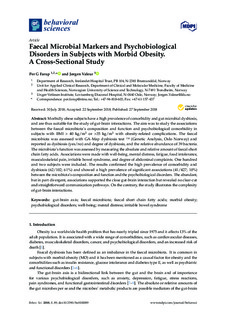| dc.contributor.author | Farup, Per Grønaas | |
| dc.contributor.author | Valeur, Jørgen | |
| dc.date.accessioned | 2018-10-17T06:41:17Z | |
| dc.date.available | 2018-10-17T06:41:17Z | |
| dc.date.created | 2018-09-27T16:27:59Z | |
| dc.date.issued | 2018 | |
| dc.identifier.issn | 2076-328X | |
| dc.identifier.uri | http://hdl.handle.net/11250/2568349 | |
| dc.description.abstract | Morbidly obese subjects have a high prevalence of comorbidity and gut microbial dysbiosis, and are thus suitable for the study of gut-brain interactions. The aim was to study the associations between the faecal microbiota’s composition and function and psychobiological comorbidity in subjects with BMI > 40 kg/m2 or >35 kg/m2 with obesity-related complications. The faecal microbiota was assessed with GA-Map dysbiosis test ™ (Genetic Analysis, Oslo Norway) and reported as dysbiosis (yes/no) and degree of dysbiosis, and the relative abundance of 39 bacteria. The microbiota’s function was assessed by measuring the absolute and relative amount of faecal short chain fatty acids. Associations were made with well-being, mental distress, fatigue, food intolerance, musculoskeletal pain, irritable bowel syndrome, and degree of abdominal complaints. One hundred and two subjects were included. The results confirmed the high prevalence of comorbidity and dysbiosis (62/102; 61%) and showed a high prevalence of significant associations (41/427; 10%) between the microbiota’s composition and function and the psychobiological disorders. The abundant, but in part divergent, associations supported the close gut-brain interaction but revealed no clear-cut and straightforward communication pathways. On the contrary, the study illustrates the complexity of gut-brain interactions. | nb_NO |
| dc.language.iso | eng | nb_NO |
| dc.publisher | MDPI | nb_NO |
| dc.rights | Navngivelse 4.0 Internasjonal | * |
| dc.rights.uri | http://creativecommons.org/licenses/by/4.0/deed.no | * |
| dc.title | Faecal microbial markers and psychobiological disorders in subjects with morbid obesity - A cross-sectional study | nb_NO |
| dc.title.alternative | Faecal microbial markers and psychobiological disorders in subjects with morbid obesity. A cross-sectional study | nb_NO |
| dc.type | Journal article | nb_NO |
| dc.type | Peer reviewed | nb_NO |
| dc.description.version | publishedVersion | nb_NO |
| dc.source.volume | 10 | nb_NO |
| dc.source.journal | Behavioral Sciences | nb_NO |
| dc.source.issue | 8 | nb_NO |
| dc.identifier.doi | 10.3390/bs8100089 | |
| dc.identifier.cristin | 1615257 | |
| dc.description.localcode | © 2018 by the authors. Licensee MDPI, Basel, Switzerland. This article is an open access article distributed under the terms and conditions of the Creative Commons Attribution (CC BY) license (http://creativecommons.org/licenses/by/4.0/). | nb_NO |
| cristin.unitcode | 194,65,15,0 | |
| cristin.unitname | Institutt for klinisk og molekylær medisin | |
| cristin.ispublished | true | |
| cristin.fulltext | preprint | |
| cristin.qualitycode | 1 | |

